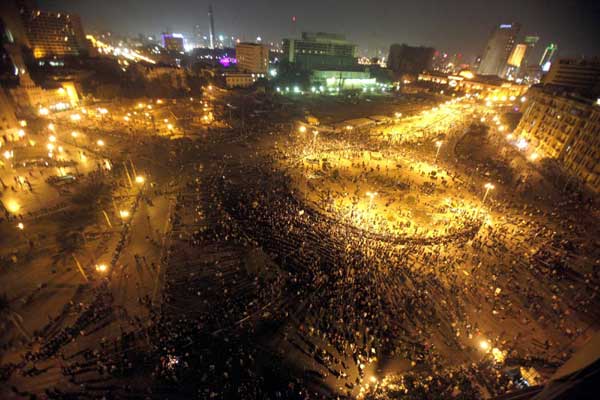Egypt morgue official: 35 dead in 3-day clashe
 |
|
A general view shows Tahrir Square as Egyptian riot policemen try to disperse protesters in Cairo November 20, 2011. [Photo/Agencies]
|
CAIRO - An Egyptian morgue official says the death toll has climbed to 35 during the third straight day of violence that has turned into the most sustained challenge yet to the rule of Egypt's military.
Most of the deaths were in the area around Cairo's central Tahrir Square, the epicenter of the uprising that ousted former President Hosni Mubarak in February.
On Monday, young activists demanding the military hand over power to a civilian government skirmished with black-clad police, hurling stones and firebombs and throwing back the tear gas canisters being fired by police into the square.
The official said 20 people had been killed Monday. He spoke on condition of anonymity because he was not authorized to brief the media.
The violence looks set to intensify with some of the protesters on Monday lobbing firebombs at the police.
"We must use force against force. We cannot just throw stones at them," said Hassan Mohammed, a protester in his 20s.
"Do you expect us to meet blood with kindness?" asked a bearded teenager climbing a tree with a firebomb in hand. "We will burn it under their feet," he added as he went on to use expletive against the Supreme Council's head, Field Marshal Hussein Tantawi.
Doctors at field hospitals set up in the square spoke of scores of protesters arriving with breathing and eye problems and wounds to the face from what they said was the excessive use of tear gas and rubber bullets.
Mohammed Mustafa, one of the doctors, said his field hospital was treating an average of 80 cases per hour and that many of the wounded did not want to be taken to hospital in ambulances because they feared arrest.
The protesters' suspicions about the military were fed by a proposal issued by the military-appointed Cabinet last week that would shield the armed forces from any civilian oversight and give the generals veto power over legislation dealing with military affairs.
But other concerns are also feeding the tensions on the street. Many Egyptians are anxious about what the impending elections will bring. Specifically they worry that stalwarts of Mubarak's ruling party could win a significant number of seats in the next parliament because the military did not ban them from running for public office as requested by activists.
The military's failure to issue such a ban has fed widely held suspicion that the generals are reluctant to dismantle the old regime, partly out of loyalty to Mubarak, their longtime mentor.
The Supreme Council of the Armed Forces issued a statement, read on state TV Sunday night, saying it does not intend to "extend the transitional period and will not permit by any means hindering the process of democratic transition."
The military-backed Cabinet said the elections due to start on Nov 28 will go ahead as scheduled.
Activists have been holding occasional protests against the military in Tahrir for months, and some have seen crackdowns by the military or police.
But this weekend's violence was the most sustained fighting between the two sides. It began when security forces stormed a sit-in at Tahrir staged by several hundred protesters wounded in clashes during the 18-day uprising in January and February and frustrated by the slow pace of bringing those responsible to justice.





















